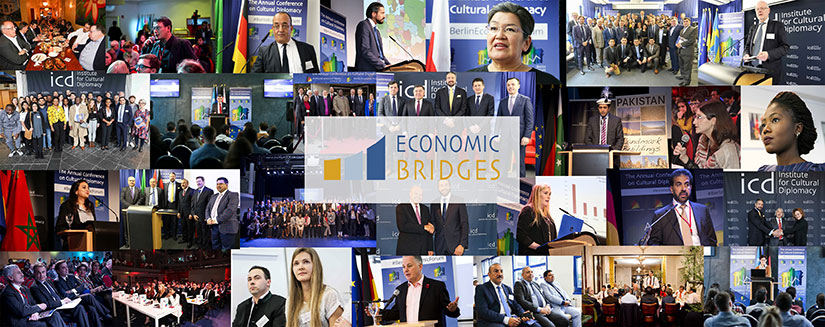About “Economic Bridges”
 The process of globalization has re-structured the rules of the contemporary economic system. The principles of bilateral and multilateral trade and investment have now changed in such a way that economic growth for example requires more than just financial exchange; It is now require diplomacy, cooperation, and cultural understanding in order to be successful.
The process of globalization has re-structured the rules of the contemporary economic system. The principles of bilateral and multilateral trade and investment have now changed in such a way that economic growth for example requires more than just financial exchange; It is now require diplomacy, cooperation, and cultural understanding in order to be successful.As the 2008 global financial crisis has demonstrated, the global economy influences all areas of our lives. It is intimately connected to issues such as extreme poverty, development immigration and integration, healthcare, education, environmental issues, and culture & the arts. As such, discussion on the future of the global economy must incorporate perspectives from a diverse range of fields and groups, including politics, civil society, and multiple academic disciplines, such as history, sociology, philosophy and the arts.
The Institute for Cultural Diplomacy has therefore established the program "Economic Bridges" to promote stronger economic relations between nation states, and to examine the complex relationship between economics, politics and culture at the global level.
Program Aims
The "Economic Bridges" Program will pursue the following goals:- To increase international trade & investment between nation states and between regions
- To encourage development aid and trade that benefits less economically developed areas
- To encourage and promote sustainable economies
- To promote Corporate Cultural Diplomacy
- To raise awareness of the advantages of cultural diplomacy and soft power in improving national brands
Academic Themes
Acknowledging the program aims outlined above, the program will focus in particular on the following academic themes:- The role of cultural diplomacy in economic policies of nation states
- The implications of economic interdependence
- The influence of the digital revolution on the future of the global economy
- The emergence of non-state actors as key players in the international environment
- The international dimension of Corporate Social Responsibility (CSR) and SRI
- Global economics and Environmental Responsibility




























































